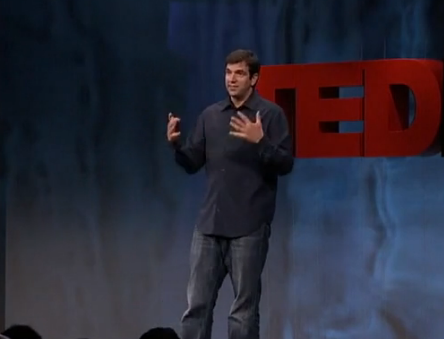And the second point I want to make, the final point, is that -- and it's actually been a theme of TEDMED
我想說的第二點,也是最后一點,實際上就是TEDMED的主題--
that joy is so important to your health, that very few of these behaviors will stick with me unless there's some sense of pleasure and joy in them.
快樂對人的健康非常重要,要不是這些行為可以帶給我快樂和愉悅的感覺,我很難能堅持下來。
And just to give you one instance of this: food.
舉一個例子:食物。
The junk food industry is really great at pressing our pleasure buttons and figuring out what's the most pleasurable.
垃圾食品行業特別擅長開啟我們的愉悅感,并帶給我們最快樂的感受。
But I think we can use their techniques and apply them to healthy food.
但是我想我們可以將他們的技術應用到健康食品領域。

To give just one example, we love crunchiness, mouthfeel.
比如說,我們喜歡脆脆的口感。
So I basically have tried to incorporate crunchiness into a lot of my recipes -- throw in some sunflower seeds.
于是我試著把這種脆脆的口感加入到我的許多食譜中--比如放一些葵花籽進去。
And you can almost trick yourself into thinking you're eating Doritos.
你就會有像吃多力多滋一樣的口感。
And it has made me a healthier person.
這使我變得更健康。
So that is it. The book about it comes out in April. It's called "Drop Dead Healthy."
就是這些。這本書四月面世。書名叫做“不要盲目追求健康”。
And I hope that I don't get sick during the book tour.
我希望新書宣傳的時候我不要病倒。
That's my greatest hope. So thank you very much.
這是我最大的愿望。非常感謝大家。











